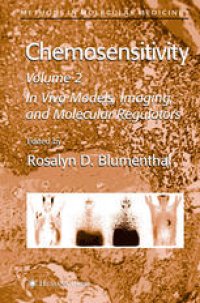
Ebook: Chemosensitivity: Volume II: In VIVO Models, Imaging, and Molecular Regulators
- Tags: Cancer Research
- Series: Methods in Molecular Medicine™ 111
- Year: 2005
- Publisher: Humana Press
- Edition: 1
- Language: English
- pdf
Chemosensitivity testing is an ex vivo means of determining or enhancing the cytotoxic and/or cytostatic, or apoptosis-inducing effects of anticancer drugs. In Chemosensitivity, leading researchers and physicians working in academia and biotech companies describe their best laboratory methods for assessing chemosensitivity in vitro and in vivo, and for assessing the parameters that modulate chemosensitivity in individual tumors. Volume 2: In Vivo Models, Imaging, and Molecular Regulators contains today's best protocols for classifying tumors into response categories and for customizing therapy to individuals. These techniques allow measurements of DNA damage, apoptotic cell death, and the molecular and cellular regulators of cytotoxicity, as well as in vivo animal modeling of chemosensitivity. Highlights include genomic and proteomic approaches to assess chemosensivity, in vivo imaging approaches to assess early response to therapy, and methods to statistically analyze data from in vivo therapy. The protocols follow the successful Methods in Molecular Medicine™ series format, each offering step-by-step laboratory instructions, an introduction outlining the principle behind the technique, lists of the necessary equipment and reagents, and tips on troubleshooting and avoiding known pitfalls. The authors also provide guidance on how best to analyze the data derived from the protocols. A companion volume, Volume 1: In Vitro Assays contains in vitro and in vivo techniques to identify which new agents or combination of agents are effective for each type of tumor.
Cutting-edge and highly practical, the two volumes of Chemosensitivity provide a comprehensive collection of readily reproducible techniques for the in vitro and in vivo screening of new agents and a set of proven approaches to understand mechanistically why certain cancer cell lines (in vitro) of tumors (in vivo) are more or less sensitive to a particular agent.